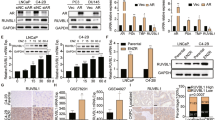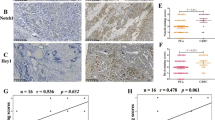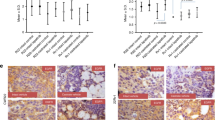Abstract
Recent studies have shown that docetaxel-based chemotherapy confers a survival benefit in patients with castration-resistant prostate cancer (PC). Also epidermal growth factor receptor (EGFR) was found to have multiple roles in prostatic tumorigenesis. However, the EGFR-mediated chemoresistance mechanism in human PC was not well delineated. In this study, we explored the mechanism of EGFR-mediated docetaxel resistance in PC. A series of stable docetaxel-resistant PC/DX sublines were established at our laboratory. The docetaxel IC50s of PC3 and PC/DX25 cells were 0.01 and 1.33 μM, respectively. Cellular resistance to docetaxel was significantly associated with increased EGFR and EGFR activation in PC/DX25. There was a dose-dependent increase in EGFR expression associated with the magnitude of docetaxel resistance. Expression of EGFR in PC/DX25 was higher than that in PC3, RWPE-1 and LNCaP cells. Similar results were also found in human PC tissues by immunohistochemical staining. We showed that docetaxel sensitivity can be stored in PC/DX25 cells by knockdown and inactivation of EGFR expression through EGFR siRNA and specific inhibitors, respectively. Contrarily, overexpression of EGFR or recombinant EGF protein treatment could rescue PC3 cells from docetaxel-mediated cytotoxicity. Gefitninb (ZD1839) significantly inhibited the growth of PC/DX25 cells by MTT in vitro and on xenografted nude mice in vivo. Moreover, EGFR-mediated docetaxel resistance occurred through the Akt-dependent ABCB1 expression in PC cells. These findings demonstrated EGFR played an important role in docetaxel-resistant PC and EGFR inhibition may enhance the therapeutic efficacy of docetaxel-based treatment.







Similar content being viewed by others
References
Altavilla A, Iacovelli R, Procopio G, Alesini D, Risi E, Campenni GM, Palazzo A, Cortesi E (2012) Medical strategies for treatment of castration resistant prostate cancer (CRPC) docetaxel resistant. Cancer Biol Ther 13:1001–1008
Attar RM, Takimoto CH, Gottardis MM (2009) Castration-resistant prostate cancer: locking up the molecular escape routes. Clin Cancer Res 15:3251–3255
Bakin RE, Gioeli D, Sikes RA, Bissonette EA, Weber MJ (2003) Constitutive activation of the Ras/mitogen-activated protein kinase signaling pathway promotes androgen hypersensitivity in LNCaP prostate cancer cells. Cancer Res 63:1981–1989
Barton S, Starling N, Swanton C (2010) Predictive molecular markers of response to epidermal growth factor receptor(EGFR) family-targeted therapies. Curr Cancer Drug Targets 10:799–812
Beer TM, El-Geneidi M, Eilers KM (2003) Docetaxel (taxotere) in the treatment of prostate cancer. Expert Rev Anticancer Ther 3:261–268
Best CJ, Gillespie JW, Yi Y, Chandramouli GV, Perlmutter MA, Gathright Y, Erickson HS, Georgevich L, Tangrea MA, Duray PH, Gonzalez S, Velasco A, Linehan WM, Matusik RJ, Price DK, Figg WD, Emmert-Buck MR, Chuaqui RF (2005) Molecular alterations in primary prostate cancer after androgen ablation therapy. Clin Cancer Res 11:6823–6834
Blagosklonny MV, Schulte T, Nguyen P, Trepel J, Neckers LM (1996) Taxol-induced apoptosis and phosphorylation of Bcl-2 protein involves c-Raf-1 and represents a novel c-Raf-1 signal transduction pathway. Cancer Res 56:1851–1854
Brawer MK, Crawford ED, Labrie F, Mendoza-Valdes A, Miller PD, Petrylak DP (2001) Androgen deprivation and other treatments for advanced prostate cancer. Rev Urol 3(Suppl 2):S59–S68
Chang JC, Wooten EC, Tsimelzon A, Hilsenbeck SG, Gutierrez MC, Elledge R, Mohsin S, Osborne CK, Chamness GC, Allred DC, O’Connell P (2003) Gene expression profiling for the prediction of therapeutic response to docetaxel in patients with breast cancer. Lancet 362:362–369
Choudhury AD, Eeles R, Freedland SJ, Isaacs WB, Pomerantz MM, Schalken JA, Tammela TL, Visakorpi T (2012) The role of genetic markers in the management of prostate cancer. Eur Urol 62:577–587
Davis JM, Navolanic PM, Weinstein-Oppenheimer CR, Steelman LS, Hu W, Konopleva M, Blagosklonny MV, McCubrey JA (2003) Raf-1 and Bcl-2 induce distinct and common pathways that contribute to breast cancer drug resistance. Clin Cancer Res 9:1161–1170
Dhomen NS, Mariadason J, Tebbutt N, Scott AM (2012) Therapeutic targeting of the epidermal growth factor receptor in human cancer. Crit Rev Oncog 17:31–50
Di LG, Tortora G, D’Armiento FP, De RG, Staibano S, Autorino R, D’Armiento M, De LM, De PS, Catalano G, Bianco AR, Ciardiello F (2002) Expression of epidermal growth factor receptor correlates with disease relapse and progression to androgen-independence in human prostate cancer. Clin Cancer Res 8:3438–3444
Domingo-Domenech J, Oliva C, Rovira A, Codony-Servat J, Bosch M, Filella X, Montagut C, Tapia M, Campas C, Dang L, Rolfe M, Ross JS, Gascon P, Albanell J, Mellado B (2006) Interleukin 6, a nuclear factor-kappaB target, predicts resistance to docetaxel in hormone-independent prostate cancer and nuclear factor-kappaB inhibition by PS-1145 enhances docetaxel antitumor activity. Clin Cancer Res 12:5578–5586
Fry MJ (2001) Phosphoinositide 3-kinase signalling in breast cancer: how big a role might it play? Breast Cancer Res 3:304–312
Hammarsten P, Rudolfsson SH, Henriksson R, Wikstrom P, Bergh A (2007) Inhibition of the epidermal growth factor receptor enhances castration-induced prostate involution and reduces testosterone-stimulated prostate growth in adult rats. Prostate 67:573–581
Hill BT, Whelan RD, Shellard SA, McClean S, Hosking LK (1994) Differential cytotoxic effects of docetaxel in a range of mammalian tumor cell lines and certain drug resistant sublines in vitro. Invest New Drugs 12:169–182
Iwao-Koizumi K, Matoba R, Ueno N, Kim SJ, Ando A, Miyoshi Y, Maeda E, Noguchi S, Kato K (2005) Prediction of docetaxel response in human breast cancer by gene expression profiling. J Clin Oncol 23:422–431
Jemal A, Siegel R, Xu J, Ward E (2010) Cancer statistics, 2010. CA Cancer J Clin 60:277–300
Kapucuoglu N, Coban T, Raunio H, Pelkonen O, Edwards RJ, Boobis AR, Iscan M (2003) Expression of CYP3A4 in human breast tumour and non-tumour tissues. Cancer Lett 202:17–23
Kim HG, Kassis J, Souto JC, Turner T, Wells A (1999) EGF receptor signaling in prostate morphogenesis and tumorigenesis. Histol Histopathol 14:1175–1182
Krasilnikov M, Adler V, Fuchs SY, Dong Z, Haimovitz-Friedman A, Herlyn M, Ronai Z (1999) Contribution of phosphatidylinositol 3-kinase to radiation resistance in human melanoma cells. Mol Carcinog 24:64–69
Lee JT Jr, Steelman LS, McCubrey JA (2004) Phosphatidylinositol 3′-kinase activation leads to multidrug resistance protein-1 expression and subsequent chemoresistance in advanced prostate cancer cells. Cancer Res 64:8397–8404
Lee JT Jr, Steelman LS, McCubrey JA (2005) Modulation of Raf/MEK/ERK kinase activity does not affect the chemoresistance profile of advanced prostate cancer cells. Int J Oncol 26:1637–1644
Li L, Wei XH, Pan YP, Li HC, Yang H, He QH, Pang Y, Shan Y, Xiong FX, Shao GZ, Zhou RL (2010) LAPTM4B: a novel cancer-associated gene motivates multidrug resistance through efflux and activating PI3K/AKT signaling. Oncogene 29:5785–5795
Lin J, Adam RM, Santiestevan E, Freeman MR (1999) The phosphatidylinositol 3′-kinase pathway is a dominant growth factor-activated cell survival pathway in LNCaP human prostate carcinoma cells. Cancer Res 59:2891–2897
Lin X, Bohle AS, Dohrmann P, Leuschner I, Schulz A, Kremer B, Fandrich F (2001) Overexpression of phosphatidylinositol 3-kinase in human lung cancer. Langenbecks Arch Surg 386:293–301
Mancuso A, Oudard S, Sternberg CN (2007) Effective chemotherapy for hormone-refractory prostate cancer (HRPC): present status and perspectives with taxane-based treatments. Crit Rev Oncol Hematol 61:176–185
Marks RA, Zhang S, Montironi R, McCarthy RP, MacLennan GT, Lopez-Beltran A, Jiang Z, Zhou H, Zheng S, Davidson DD, Baldridge LA, Cheng L (2008) Epidermal growth factor receptor (EGFR) expression in prostatic adenocarcinoma after hormonal therapy: a fluorescence in situ hybridization and immunohistochemical analysis. Prostate 68:919–923
Martinez-Lorenzo MJ, Anel A, Monleon I, Sierra JJ, Pineiro A, Naval J, Alava MA (2000) Tyrosine phosphorylation of the p85 subunit of phosphatidylinositol 3-kinase correlates with high proliferation rates in sublines derived from the Jurkat leukemia. Int J Biochem Cell Biol 32:435–445
McCubrey JA, Steelman LS, Abrams SL, Lee JT, Chang F, Bertrand FE, Navolanic PM, Terrian DM, Franklin RA, D’Assoro AB, Salisbury JL, Mazzarino MC, Stivala F, Libra M (2006) Roles of the RAF/MEK/ERK and PI3K/PTEN/AKT pathways in malignant transformation and drug resistance. Adv Enzyme Regul 46:249–279
Montgomery RB, Guzman J, O’Rourke DM, Stahl WL (2000) Expression of oncogenic epidermal growth factor receptor family kinases induces paclitaxel resistance and alters beta-tubulin isotype expression. J Biol Chem 275:17358–17363
Moss RA, Petrylak DP (2006) Cytotoxic chemotherapy for prostate cancer: who and when? Curr Treat Options Oncol 7:370–377
Murray S, Briasoulis E, Linardou H, Bafaloukos D, Papadimitriou C (2012) Taxane resistance in breast cancer: mechanisms, predictive biomarkers and circumvention strategies. Cancer Treat Rev 38:890–903
Nicholson KM, Anderson NG (2002) The protein kinase B/Akt signalling pathway in human malignancy. Cell Signal 14:381–395
Noguchi S (2006) Predictive factors for response to docetaxel in human breast cancers. Cancer Sci 97:813–820
Patel R, Leung HY (2012) Targeting the EGFR-family for therapy: biological challenges and clinical perspective. Curr Pharm Des 18:2672–2679
Patterson SG, Wei S, Chen X, Sallman DA, Gilvary DL, Zhong B, Pow-Sang J, Yeatman T, Djeu JY (2006) Novel role of Stat1 in the development of docetaxel resistance in prostate tumor cells. Oncogene 25:6113–6122
Pei H, Li L, Fridley BL, Jenkins GD, Kalari KR, Lingle W, Petersen G, Lou Z, Wang L (2009) FKBP51 affects cancer cell response to chemotherapy by negatively regulating Akt. Cancer Cell 16:259–266
Petrylak DP, Tangen CM, Hussain MH, Lara PN Jr, Jones JA, Taplin ME, Burch PA, Berry D, Moinpour C, Kohli M, Benson MC, Small EJ, Raghavan D, Crawford ED (2004) Docetaxel and estramustine compared with mitoxantrone and prednisone for advanced refractory prostate cancer. N Engl J Med 351:1513–1520
Pu YS (2000) Prostate cancer in Taiwan: epidemiology and risk factors. Int J Androl 23(Suppl 2):34–36
Pu YS, Huang CY, Kuo YZ, Kang WY, Liu GY, Huang AM, Yu HJ, Lai MK, Huang SP, Wu WJ, Chiou SJ, Hour TC (2009) Characterization of membranous and cytoplasmic EGFR expression in human normal renal cortex and renal cell carcinoma. J Biomed Sci 16:82
Ringel I, Horwitz SB (1991) Studies with RP 56976 (taxotere): a semisynthetic analogue of taxol. J Natl Cancer Inst 83:288–291
Rosenzweig SA (2012) Acquired resistance to drugs targeting receptor tyrosine kinases. Biochem Pharmacol 83:1041–1048
Sapi E, Alvero AB, Chen W, O’Malley D, Hao XY, Dwipoyono B, Garg M, Kamsteeg M, Rutherford T, Mor G (2004) Resistance of ovarian carcinoma cells to docetaxel is XIAP dependent and reversible by phenoxodiol. Oncol Res 14:567–578
Shalli K, Brown I, Heys SD, Schofield AC (2005) Alterations of beta-tubulin isotypes in breast cancer cells resistant to docetaxel. FASEB J 19:1299–1301
Shore N, Mason M, de Reijke TM (2012) New developments in castrate-resistant prostate cancer. BJU Int 109(Suppl 6):22–32
Shou J, Massarweh S, Osborne CK, Wakeling AE, Ali S, Weiss H, Schiff R (2004) Mechanisms of tamoxifen resistance: increased estrogen receptor-HER2/neu cross-talk in ER/HER2-positive breast cancer. J Natl Cancer Inst 96:926–935
St-Arnaud R, Poyet P, Walker P, Labrie F (1988) Androgens modulate epidermal growth factor receptor levels in the rat ventral prostate. Mol Cell Endocrinol 56:21–27
Traish AM, Morgentaler A (2009) Epidermal growth factor receptor expression escapes androgen regulation in prostate cancer: a potential molecular switch for tumour growth. Br J Cancer 101:1949–1956
van Brussel JP, Mickisch GH (2003) Multidrug resistance in prostate cancer. Onkologie 26:175–181
Wosikowski K, Silverman JA, Bishop P, Mendelsohn J, Bates SE (2000) Reduced growth rate accompanied by aberrant epidermal growth factor signaling in drug resistant human breast cancer cells. Biochim Biophys Acta 1497:215–226
Yang SH (2013) Molecular basis of drug resistance: epidermal growth factor receptor tyrosine kinase inhibitors and anaplastic lymphoma kinase inhibitors. Tuberc Respir Dis 75:188–198
Yarden Y, Sliwkowski MX (2001) Untangling the ErbB signalling network. Nat Rev Mol Cell Biol 2:127–137
Zhu Y, Liu C, Nadiminty N, Lou W, Tummala R, Evans CP, Gao AC (2013) Inhibition of ABCB1 expression overcomes acquired docetaxel resistance in prostate cancer. Mol Cancer Ther 12:1829–1836
Acknowledgments
Special thanks to Dr. Long-Yuan Li (Graduate Institute of Cancer Biology, China Medical University, Taichung, Taiwan), who kindly provided the full-length EGFR expressing plasmid in this study, as well as Dr. Hua-Chien Chen and Dr. Shu-Jen Chen (Department of Life Science, Chang Gung University, Tao-Yuan, Taiwan) for their excellent technical assistances of cDNA microarray. This study is funded by National Science Council, Executive Yuan, Taiwan (Grant No. NSC96-2314-B-037-010, NSC 101-2314-B-037-008-MY3 and NSC99-2314-B-037-020-MY3) and Far Eastern Memorial Hospital, New Taipei City, Taiwan (Grant No. FEMH-2012-C-009).
Conflict of interest
The authors declare that they have no conflict of interest.
Author information
Authors and Affiliations
Corresponding authors
Rights and permissions
About this article
Cite this article
Hour, TC., Chung, SD., Kang, WY. et al. EGFR mediates docetaxel resistance in human castration-resistant prostate cancer through the Akt-dependent expression of ABCB1 (MDR1). Arch Toxicol 89, 591–605 (2015). https://doi.org/10.1007/s00204-014-1275-x
Received:
Accepted:
Published:
Issue Date:
DOI: https://doi.org/10.1007/s00204-014-1275-x




